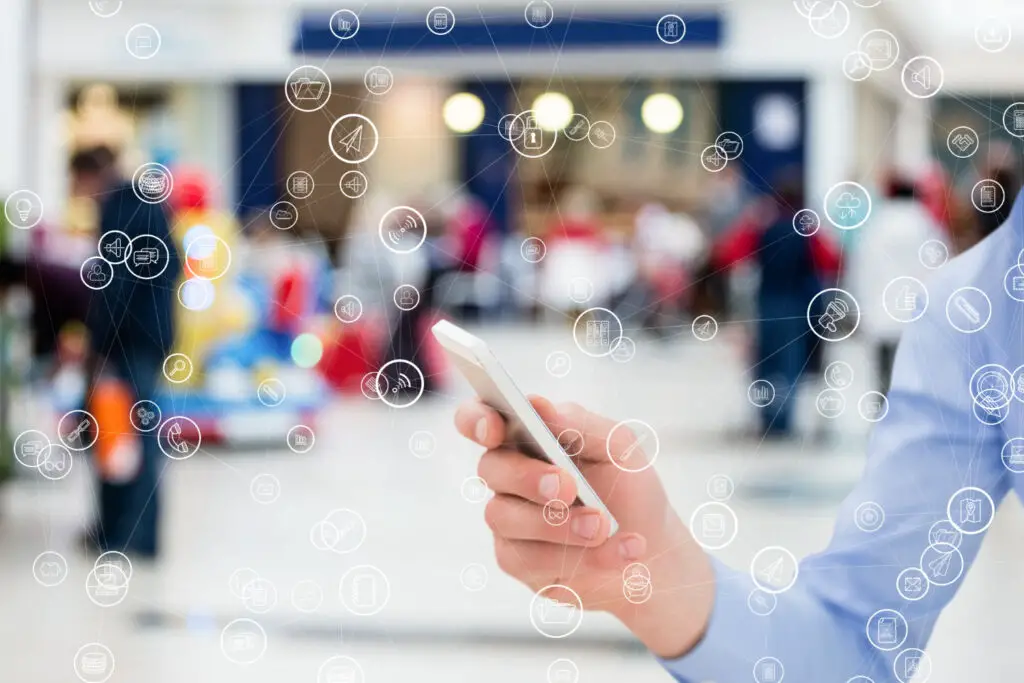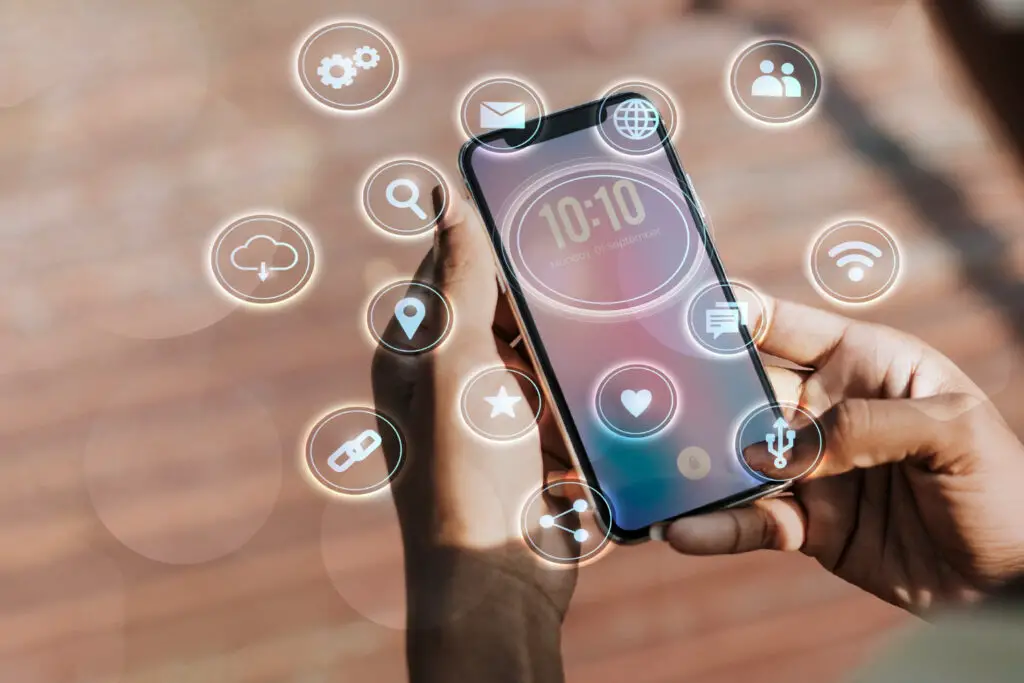In the modern world, smartphones have become an integral part of our daily lives, revolutionizing the way we communicate, work, and entertain ourselves.
These devices have evolved from being mere communication tools to becoming multifaceted gadgets that cater to a wide array of our daily needs and activities. So, let’s explore the various facets of how smartphones have become indispensable in our everyday lives.
Communication
The primary function of a smartphone, communication, has evolved significantly. Gone are the days of simple voice calls and text messages. Smartphones now offer a plethora of communication options, including video calls, instant messaging, emails, and social media platforms. They enable us to stay connected with friends, family, and colleagues, regardless of geographical distances.
The advent of video calling and conferencing apps has particularly transformed our communication experience, allowing for more personal and interactive conversations. This has been especially crucial in maintaining personal and professional relationships during periods like the COVID-19 pandemic, where face-to-face interactions were limited.
Furthermore, social media apps have turned smartphones into a hub for social interaction, enabling users to share life updates, photos, and thoughts in real-time, fostering a sense of community and belonging. The ease of sending quick messages or emails through smartphones has also streamlined professional communication, making it more efficient and accessible. Learn more on this link https://punchng.com/ways-to-prolong-your-smartphone-battery-life/.
Constant Flow of Information
Smartphones have become powerful tools for information access and learning. With the internet just a few taps away, they offer an unprecedented level of access to information. Whether it’s staying updated with the latest news, researching a topic, or learning a new skill, smartphones provide a portal to vast resources.
The convenience of having access to educational materials, e-books, online courses, and tutorials through smartphones has democratized learning. People can educate themselves on almost any subject without the need for physical books or attending in-person classes. This ease of access to information has also played a crucial role in self-improvement and continuous learning, which is vital in the fast-paced, ever-evolving modern world.
Entertainment
Smartphones have become our go-to devices for entertainment. They offer music streaming, video streaming, gaming, and access to social media – all in one compact device. The ability to watch movies or listen to music on the go has transformed how we consume entertainment, making it more personalized and accessible.
Gaming on smartphones has also seen a significant rise, with games ranging from simple puzzles to complex strategy games. The social aspect of gaming has been enhanced by the ability to connect with other players worldwide, creating a vast gaming community.
Navigation and Travel Made Easy
The integration of GPS technology into smartphones has revolutionized navigation and travel. With map applications, users can get real-time directions to virtually anywhere, along with information on traffic conditions, public transportation, and estimated travel times. This has made traveling to unfamiliar places much less daunting and more efficient.
Additionally, smartphones have become essential travel companions, allowing users to book flights, accommodations, and even local experiences through various apps. They also serve as digital wallets, storing boarding passes, hotel reservations, and tickets, adding convenience to travel.
Health and Fitness Monitoring
The surge in health and fitness apps has turned smartphones into personal health monitors. These apps track various health metrics like steps taken, calories burned, heart rate, and even sleep patterns. They also offer personalized workout routines, nutrition tracking, and meditation guides, making it easier for users to maintain a healthy lifestyle.
For many, smartphones have become an essential part of their fitness regime, providing motivation through goal setting, progress tracking, and reminders to stay active. The ability to monitor health metrics in real-time has also brought about a greater awareness of one’s health and wellness.
Business and Financial Management
Smartphones play a significant role in business and financial management. They facilitate mobile banking, budget tracking, and financial planning through various apps. The ability to perform financial transactions, check account balances, and manage investments on the go has given users more control over their finances.
For businesses, smartphones allow for managing work on the go. They enable quick access to emails, work documents, and business applications, allowing professionals to stay productive even when away from the office. This mobility has been instrumental in the rise of remote working and digital nomadism.
Photography and Content Creation
The advancements in smartphone camera technology have turned these devices into high-quality cameras that fit in our pockets. This has democratized photography, allowing everyone to capture and share moments without the need for a separate camera.
The ease of taking and sharing photos and videos has also fueled the growth of content creation and sharing on platforms like Instagram, YouTube, and TikTok.
Making People Safer
One of the most important things that smartphones do every day is help people feel safer and more ready for situations. A smartphone can be lifesaving in an emergency because it lets you call for help, get in touch with emergency services, and let your loved ones know you’re safe.
There are now emergency SOS features on many smartphones that, when turned on, can send alerts and share the user’s position with emergency services and named contacts. Also, smartphones can be very helpful for getting ready for disasters because they let you get real-time reports for things like storms, earthquakes, and floods. This instant access to important information can be very important for keeping people safe and letting people act quickly in emergencies.
With the rise of safety apps, smartphones have also become personal safety gadgets. When a user feels unsafe, these apps can send them automated texts, set off alarms, or find out where they are. Parents can feel better about their kids’ safety knowing they can keep track of where their kids’ phones are.
Basically, the smartphone has become an important part of our personal security kit because it helps us avoid dangerous situations and act quickly when they do happen.
How to Get a Cheap Mobile Plan?
Landing a cheap mobile plan can significantly reduce your monthly expenses without compromising the quality of service. With numerous providers and a variety of plans available, choosing the most cost-effective option can be challenging.
However, with some research and strategic planning, you can find a plan that suits your needs and budget. Here are a couple of detailed tips on how to secure a cheap mobile plan:
Figure Out How Much Data You Use
Start by analyzing your past mobile usage. It’s essential to have a clear understanding of your specific needs before hunting for the beste cheap mobile plan. Check your old phone bills to see how much Internet, call minutes, and text messages you usually use. This will help you avoid paying for more than you need or choosing a plan that falls short of your requirements.
Consider whether most of your calls are local or if you need a significant amount of international calling minutes. Similarly, evaluate your data usage pattern. If you often connect to Wi-Fi at home or work, you may not need a large data plan.
Explore Different Carriers and Plans
Don’t limit yourself to the major, well-known carriers. Often, smaller or regional carriers offer competitive plans at lower prices. These carriers often use the same networks as the bigger carriers but offer cheaper plans. Explore the options available from these providers, comparing their plans to those of larger carriers.
When comparing plans, look beyond just the monthly fee. Consider any additional costs, such as activation fees, the cost of a new handset if it’s not a SIM-only plan, and charges for services like voicemail or caller ID. Also, be wary of plans that seem unusually cheap but may have hidden costs or poor service coverage.
Consider No-Contract and Prepaid Plans
No-contract and prepaid mobile plans can often be more cost-effective than traditional contract plans. With no-contract plans, you’re not tied to a long-term commitment, giving you the flexibility to switch providers or plans without incurring penalties. This is particularly advantageous if your mobile usage varies significantly from month to month, as it allows you to adjust your plan as needed.
Prepaid plans, where you pay for your usage upfront, can also help in managing your budget better and avoiding unexpected charges. These plans are especially beneficial for those who have a fixed monthly budget for mobile expenses. Moreover, they often do not require a credit check, making them accessible to a wider range of customers.
Look for Discounts and Bundle Deals
Many carriers offer discounts and promotional deals that can reduce the cost of your mobile plan. This can include discounts for students, seniors, military personnel, or corporate employees. Always ask about any potential discounts that you might be eligible for.
Monitor and Adjust Your Plan Regularly
Mobile needs can change over time, so it’s important to regularly review and adjust your plan. Keep an eye on your monthly usage and if you consistently use less data, minutes, or texts than your plan allows, consider downgrading to a cheaper plan.
Conversely, if you frequently exceed your plan’s limits, it might be more cost-effective to upgrade to a plan with higher limits to avoid overage charges.










0 Comments